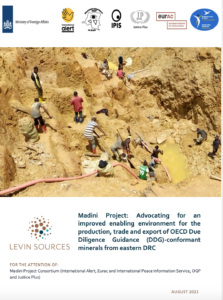As part of the Madini project, a review of the current situation, trends and barriers in the production, trade and export of tin, tantalum, tungsten (3T) and gold from eastern Democratic Republic of Congo (DRC) was conducted by Levin Sources, with the aim to recommend concrete actions that can improve OECD-conformant sourcing of these minerals from eastern DRC.
The link between the exploitation of natural resources and protracted conflict in (eastern) DRC has long been of international concern. To avoid that resource exploitation would finance conflict, promote illicit trade and be linked to severe human rights abuses, increasingly more guidelines – such as the OECD Due Diligence Guidance – legislation – such as the US Dodd-Frank Act (2010) or the 2021 EU Minerals Regulation 2017/821 -, regional regulation schemes – such as the ICGLR’s Regional Certification Mechanism – and responsible supply chain mechanisms – such as the ITSCI traceability scheme for 3T minerals – have been put in place over the past decade. However, trends point towards a growing consensus that these compliance-only approaches have resulted in high-levels of disengagement with or boycotting of conflict-affected and high-risk areas (CAHRAs) such as eastern DRC, resulting in loss of livelihoods for mining communities and pushing small-scale actors into the informal sector.
The purpose of this report is to
(1) summarise the current situation and recent trends in relation to the production, trade and export of 3T minerals and gold from eastern DRC
(2) identify the continued constraints and barriers faced by upstream supply chain actors to meet international normative and legal requirements relating to responsible sourcing and the impact that this is having on achieving stable access international markets, and
(3) provide concrete recommendations to the Madini project as to (i) what strategies it can employ to overcome these barriers, thereby facilitating responsible supply chains that in turn contribute to increased peace, security and stability at the local level and (ii) formulate recommendations for a wider project advocacy strategy implicating key stakeholders to improve the enabling environment to contribute to this objective.
Explore the full report and its six key recommendations here:


